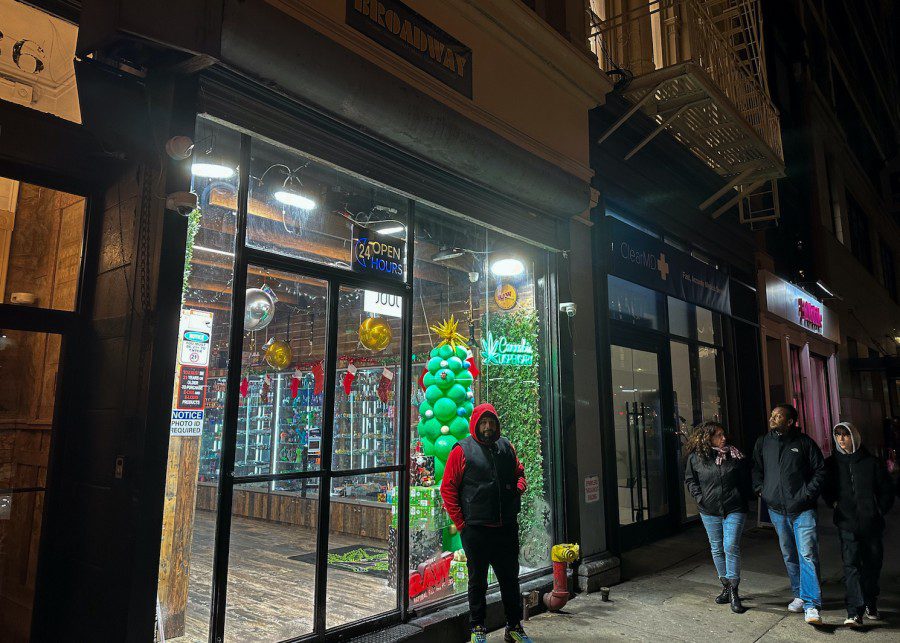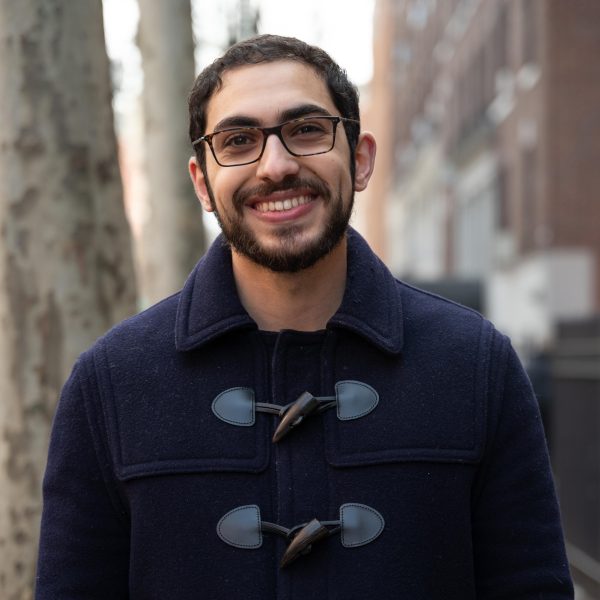Unlicensed weed stores pose as legitimate dispensaries, enticing NYU buyers
The slow rollout of cannabis vendor licenses in New York has led unlicensed sellers with legitimate-looking storefronts to dominate the market.
An unlicensed cannabis dispensary on Broadway, near Astor Place. (Yezen Saadah for WSN)
December 9, 2022
Washington Square Park, the geographic and social center of NYU’s Manhattan campus, is infamous for its weed vendors. But since former Governor Andrew Cuomo signed a bill to legalize recreational cannabis use in New York last April, many NYU students are turning to yet-unlicensed, quasi-legal dispensaries instead, with brick-and-mortar storefronts that make them appear more legitimate than they truly are.
The distribution of licenses for the legal sale of cannabis has been a slow process. On Nov. 21 of this year, the first 36 recreational dispensary licenses in New York state were allocated. Twenty-eight were given to shops operated by individuals with previous cannabis-related convictions.
Though a concrete timeline for their opening has not yet been announced, the newly licensed dispensaries are expected to begin business by the end of the year. None have opened as of the publication of this article. But from Broadway to Bleecker Street, unassuming retail outlets are openly selling and advertising weed and weed products. Most students who purchase weed from these storefront dispensaries are not aware that they are unlicensed.
GLS senior Lauren Collins said that she typically buys disposable weed pens from Cannabis Dispensary on Broadway if she is on campus, but added that she is careful about what she purchases.
“I’ve seen a lot more cannabis stores open up, especially in Bushwick and near Washington Square Park,” Collins said. “I’ve never looked to see if they’re operating legally, but I’m pretty sure they’re not, which is why I only buy pens that I can search for online by recognizable brands. Usually the people working the front don’t know much about the products themselves — which isn’t reassuring.”
Unlicensed dispensaries sometimes sell cannabis products that are mislabeled, below legal standards, contaminated with bacteria or pesticides and without asking for identification, according to a study published on Nov. 30 by the New York Medical Cannabis Industry Association, a group of 10 cannabis production, sales and dispensary companies with locations in New York.
The New York Times first reported on the study, which is under review by city officials, and noted that experts “advised caution in interpreting the findings,” since bacteria in smoking products die when they are burned and that some substances — including pesticides — can be safe in small doses.
“Unregulated and unlicensed operators undermine the legal market, and lack of enforcement against these operators entrenches bad behavior that could dissuade legacy operators from pursing a legal vending route,” said New York City Council member Carlina Rivera, whose constituency includes the East Village, when the report was first published.
Another NYU student, who requested anonymity due to employment concerns, said she also worries about buying potentially unsafe cannabis at unregulated dispensaries.
“I’m conflicted about unlicensed dispensaries,” the student, a CAS junior, said. “I have had some experiences where I worried my weed was laced. I am pretty wary of an unregulated market.”
The student — who said she has avoided buying weed in Washington Square Park since receiving a ticket there earlier this semester — said she usually goes to Smokers Zone on 14th Street, which sometimes offers her a student discount. Smokers Zone is unlicensed, but the student said she was unaware of the store’s status.
Weed contaminated with other substances, such as bacteria, fungus and filler materials, can pose serious health concerns to those who use cannabis recreationally. Synthetic cannabinoids — man-made chemicals that are sprayed on plant material and sometimes sold as cannabis alternatives — can cause potentially life-threatening health effects and psychosis. Synthesized Vitamin E oil, often used to dilute cannabis oil for vaping, was associated with multiple vaping-related deaths in 2019.
Contact Yezen Saadah at [email protected].




























































































































































